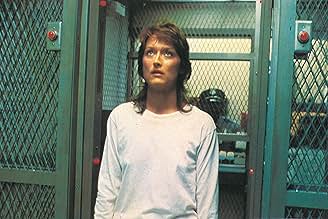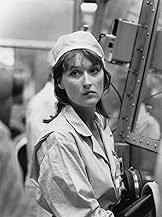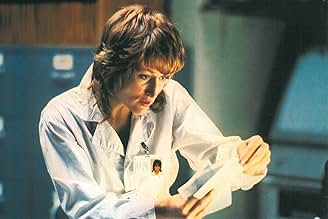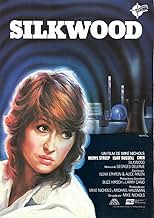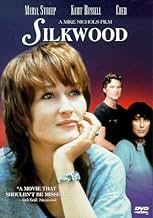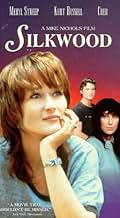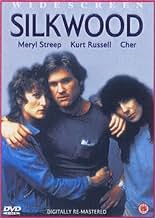Basado en un hecho real narra la historia de Karen Silkwood, una trabajadora de una central nuclear de Oklahoma, que luchó por desvelar las ineficaces medidas de seguridad de su empresa.Basado en un hecho real narra la historia de Karen Silkwood, una trabajadora de una central nuclear de Oklahoma, que luchó por desvelar las ineficaces medidas de seguridad de su empresa.Basado en un hecho real narra la historia de Karen Silkwood, una trabajadora de una central nuclear de Oklahoma, que luchó por desvelar las ineficaces medidas de seguridad de su empresa.
- Dirección
- Guionistas
- Elenco
- Nominado a 5 premios Óscar
- 2 premios ganados y 19 nominaciones en total
- Dirección
- Guionistas
- Todo el elenco y el equipo
- Producción, taquilla y más en IMDbPro
Opiniones destacadas
Intense 1980s flick that is based on the true story of Karen Silkwood (Meryl Streep in an Oscar-nominated role), a woman at a plutonium plant who began to talk about what really went on at the facility where she was employed. It seems that nuclear tampering would lead to the poisoning of the plant's employees and the pollution of the environment. Silkwood was about to talk to the New York Times about the Oklahoma plant when she died under mysterious circumstances in a car accident. The audience knows what is going to happen, but it is getting there that is the fascinating part. Mike Nichols' Oscar-nominated direction is arguably the best of his career, with the exception of his work on "The Graduate". Cher (also Oscar-nominated) proved that she was a legitimate actress as Streep's lesbian co-worker. Kurt Russell also gives his finest performance as Streep's on-again-off-again boyfriend. However with all that said, it is Meryl Streep who gives one of her finest performances in this memorable, remarkable and important motion picture. 4.5 out of 5 stars.
The lives of working class Americans are shamefully under-represented by Hollywood, and when a poor person is depicted (as something other than a criminal), it's almost always with the subtext of hope and the American dream. But hope isn't what drives someone, like the real-life Karen Silkwood, to risk her life working with plutonium for the only employer in a company town. Silkwood didn't find hope, but she did get scared, and angry, and put her job (and those of her colleagues) at stake to uncover dangerous practices before dying a mysterious death. 'Silkwood' the movie doesn't give us the glib conclusions of a conspiracy thriller (it refrains from giving an opinion on her cause of death), but it does give an excellent portrait of life at the bottom, and the mounting sense of claustrophobia and paranoia that accompanied Karen's perilous voyage of discovery. Meryl Streep does an excellent job in the title role, portraying a woman gradually losing her sanity, and the whole cast is good, even Cher in an unglamorous role. In conclusion, this is a serious and important film; and a reminder for the fortunate how hard, and ugly, life can be, even in the "land of the free".
As we don't really know what happened to Karen Silkwood for an exact certainty this film gives us a pretty accurate account of those last months of her life when a very ordinary and pedestrian life became a symbol of union activism and the power of plutocracy to have their way.
When Harvey Milk went out and became a gay activist he reflected that in the 40 years he'd been living on planet earth he hadn't really left much of a mark up to that time. Karen Silkwood didn't even have that much time left to her. The last couple of years of her life were devoted to union activism and it was that activism that indirectly or directly led to her death depending on your point of view.
As an a union leader she even faced the criticisms of her own rank and file for not working as they felt for more traditional issues like a pay raise, less hours etc. Her concentration was the plant safety at Kerr- McGee where she and others worked making plutonium pellets for nuclear fuel rods. As such she and her co-workers were exposed to radiation, exposed a lot more she feared than her employers let on. That's fairly well proved in the film and in life.
As to her death the speculation is that it was not just an automobile accident, but something that was arranged by Kerr-McGee as she was on her way to meet a New York Times reporter with documentation of Kerr- McGee's failings on the issue of safety. That's the part that has left her story a mystery until this day, a mystery that the film Silkwood takes no real position.
But despite that the film got five Oscar nominations for Meryl Streep one of her collection of Best Actress nominations for the title role. Mike Nichols got one for Best Director and there were nominations in the writing and editing categories.
Cher spread her thespian wings in Silkwood playing Streep's best friend and lesbian roommate and fellow worker. She got some deserved rave reviews and this led to a second career as actress. In her whole career Cher has never really mixed her singing and her acting. Thirty years ago she probably would have been Hollywood musicals of mixed quality so she's eschewed musical films. I think that's conscious decision she's made and it's worked out well for her.
Sadly being ignored by the Academy was Kurt Russell playing Streep's live in boyfriend. From child actor to Disney bubble gum star to action adventure films, Russell finally got a real acting role he could create a character with and did so. Mostly his career has been action/adventure stuff, but here and in other films like Unlawful Entry and the Mean Season he's shown some acting chops without shooting people or breaking heads.
The film Silkwood as a totality is not as good as the outstanding performances these three players give in it. But it still remains a testament to the life and example of Karen Silkwood.
When Harvey Milk went out and became a gay activist he reflected that in the 40 years he'd been living on planet earth he hadn't really left much of a mark up to that time. Karen Silkwood didn't even have that much time left to her. The last couple of years of her life were devoted to union activism and it was that activism that indirectly or directly led to her death depending on your point of view.
As an a union leader she even faced the criticisms of her own rank and file for not working as they felt for more traditional issues like a pay raise, less hours etc. Her concentration was the plant safety at Kerr- McGee where she and others worked making plutonium pellets for nuclear fuel rods. As such she and her co-workers were exposed to radiation, exposed a lot more she feared than her employers let on. That's fairly well proved in the film and in life.
As to her death the speculation is that it was not just an automobile accident, but something that was arranged by Kerr-McGee as she was on her way to meet a New York Times reporter with documentation of Kerr- McGee's failings on the issue of safety. That's the part that has left her story a mystery until this day, a mystery that the film Silkwood takes no real position.
But despite that the film got five Oscar nominations for Meryl Streep one of her collection of Best Actress nominations for the title role. Mike Nichols got one for Best Director and there were nominations in the writing and editing categories.
Cher spread her thespian wings in Silkwood playing Streep's best friend and lesbian roommate and fellow worker. She got some deserved rave reviews and this led to a second career as actress. In her whole career Cher has never really mixed her singing and her acting. Thirty years ago she probably would have been Hollywood musicals of mixed quality so she's eschewed musical films. I think that's conscious decision she's made and it's worked out well for her.
Sadly being ignored by the Academy was Kurt Russell playing Streep's live in boyfriend. From child actor to Disney bubble gum star to action adventure films, Russell finally got a real acting role he could create a character with and did so. Mostly his career has been action/adventure stuff, but here and in other films like Unlawful Entry and the Mean Season he's shown some acting chops without shooting people or breaking heads.
The film Silkwood as a totality is not as good as the outstanding performances these three players give in it. But it still remains a testament to the life and example of Karen Silkwood.
One of the things that many movies are missing these days are the small details and things that happen in everyday life - and how we are able to learn about characters through small visual clues rather than the large hammer of exposition-driven dialogue.
For instance, in the scene where the characters are looking at the slides of the trip to Washington: towards the end are two photos with Streep and Ron Silver's character. In the second photo, she leans into him a little bit. That tiny bit of body language makes us wonder - and Kurt Russell's character too. He suddenly moves his arm from around Streep's and suddenly she's aware that something's wrong. It's all in the unspoken. There isn't a preceding scene where she picks up the other guy, or goes to bed with him or even lies to Kurt Russell. It just cuts to this scene, and we the viewer learn along with Kurt that she's been unfaithful - which also reveals a little more about this person Karen Silkwood.
She's not a perfect hero - she's flighty, irresponsible, impulsive and non-committal - so the question becomes, why did she change? Why did she risk her life when she finally truly understood the risks? And how does Kurt Russell come to terms with this changed person he is in love with, given that he is just a guy who knows how to fix a car not save the world?
Watch Mike Nichols' inspired direction; he rarely cuts away in the middle of a scene. A lot of Kurt, Cher and Meryl's acting happens all in one take. *That's* truly good acting and directing.
Good dialogue in a film is in knowing what's happening without it being said. Don't fast forward the first hour - really pay attention and see how much you learn from the small details that will enrich your viewing of this film.
For instance, in the scene where the characters are looking at the slides of the trip to Washington: towards the end are two photos with Streep and Ron Silver's character. In the second photo, she leans into him a little bit. That tiny bit of body language makes us wonder - and Kurt Russell's character too. He suddenly moves his arm from around Streep's and suddenly she's aware that something's wrong. It's all in the unspoken. There isn't a preceding scene where she picks up the other guy, or goes to bed with him or even lies to Kurt Russell. It just cuts to this scene, and we the viewer learn along with Kurt that she's been unfaithful - which also reveals a little more about this person Karen Silkwood.
She's not a perfect hero - she's flighty, irresponsible, impulsive and non-committal - so the question becomes, why did she change? Why did she risk her life when she finally truly understood the risks? And how does Kurt Russell come to terms with this changed person he is in love with, given that he is just a guy who knows how to fix a car not save the world?
Watch Mike Nichols' inspired direction; he rarely cuts away in the middle of a scene. A lot of Kurt, Cher and Meryl's acting happens all in one take. *That's* truly good acting and directing.
Good dialogue in a film is in knowing what's happening without it being said. Don't fast forward the first hour - really pay attention and see how much you learn from the small details that will enrich your viewing of this film.
Karen Silkwood (Meryl Streep) lives in Oklahoma with her boyfriend Drew Stephens (Kurt Russell) and best friend lesbian Dolly Pelliker (Cher). Her kids live with their father in Texas. The three friends are low-skilled workers at the Kerr-McGee Cimarron Site where they manufacture fuel rods for nuclear reactors. With mounting work and lax safety, Karen starts to talk union causing tension with the company. Eventually, she gets mysteriously irradiated.
Meryl Streep is the best. She delivers a fully-fleshed out character of real depth. The movie is a bit slow and meandering. It would be great to have a tighter and more direct film. Then there is the final text. It seems like a bunch of stuff from the legal department to safeguard against lawsuits. They may as well fictionalize the movie instead. The performances are terrific. The story is compelling.
Meryl Streep is the best. She delivers a fully-fleshed out character of real depth. The movie is a bit slow and meandering. It would be great to have a tighter and more direct film. Then there is the final text. It seems like a bunch of stuff from the legal department to safeguard against lawsuits. They may as well fictionalize the movie instead. The performances are terrific. The story is compelling.
¿Sabías que…?
- TriviaThe scene where Karen sets off the radiation alarms actually happened. Her level of contamination was forty times the safe limit.
- ErroresAfter Karen's first contamination, she and Drew are at home, and Drew is laid out on the bed playing his banjo, and black (X) marks can be seen on the quilt.
These are not actor position marks, but (repeating) parts of the quilt pattern. Drew's body lining up on the marks is just chance.
- Citas
Karen Silkwood: You think I contaminated myself, you think I did that?
Mace Hurley: I think you'd do just about anything to shut down this plant.
- ConexionesEdited into The Clock (2010)
- Bandas sonorasSilkwood Main Titles
Written and Performed by Georges Delerue Et Son Orchestre
Selecciones populares
Inicia sesión para calificar y agrega a la lista de videos para obtener recomendaciones personalizadas
- How long is Silkwood?Con tecnología de Alexa
Detalles
- Fecha de lanzamiento
- País de origen
- Sitio oficial
- Idioma
- También se conoce como
- Escándalo nuclear
- Locaciones de filmación
- Productoras
- Ver más créditos de la compañía en IMDbPro
Taquilla
- Presupuesto
- USD 10,000,000 (estimado)
- Total en EE. UU. y Canadá
- USD 35,615,609
- Fin de semana de estreno en EE. UU. y Canadá
- USD 1,218,322
- 18 dic 1983
- Total a nivel mundial
- USD 35,616,970
- Tiempo de ejecución
- 2h 11min(131 min)
- Mezcla de sonido
- Relación de aspecto
- 1.85 : 1
Contribuir a esta página
Sugiere una edición o agrega el contenido que falta


